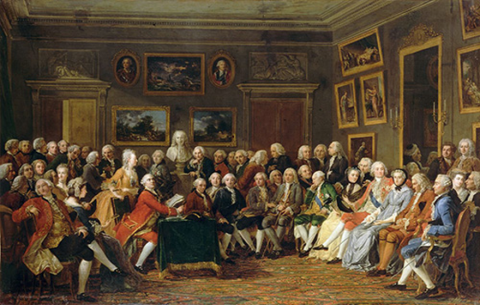Topics in History Lecture
HISTORY 390
Many of the leading Enlightenment philosophes, from Lemonnier, The Reading of Voltaire’s Tragedy of the Orphan of China.
What was the Enlightenment? Were its leading thinkers really so enlightened? And to what degree did they contribute to the shaping of the modern world? Why, finally, has this period become a flashpoint for major debates about the very nature of intellectual and political history? Did the Enlightenment really give birth to instrumental forms of reason that have primarily served the technologies of empire and repression? Or is there still a case to be made that at least some Enlightenment philosophes developed new forms of social and political criticism that contributed to the emergence of the public sphere, along with democracy and notions of religious and intellectual tolerance?
In this seminar – which will combine short lectures with discussion – we will explore Enlightenment thinkers and their networks throughout Europe and the Atlantic World. We will give particular attention to the role of women in the shaping of the intellectual culture of this period. And students will have an opportunity to work with an original Enlightenment text in the Rubenstein.
Class is open not only to juniors and seniors but also to first- and second year students with a strong history background.

